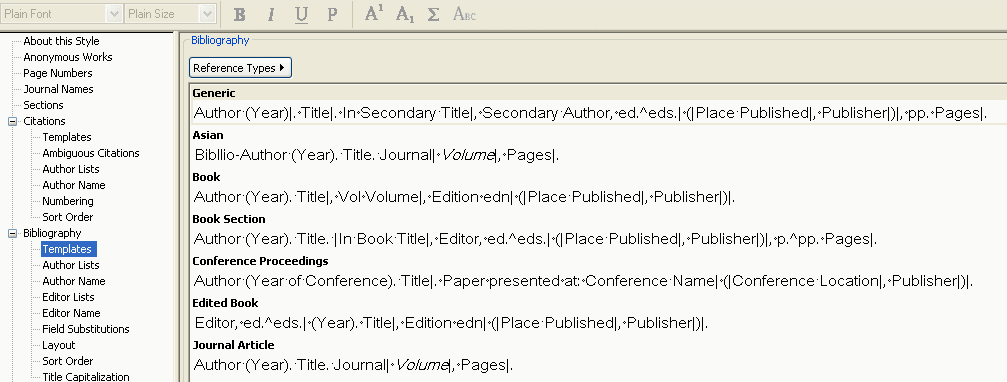Hi all,
Here’s my update, I’ve got a solution.
EndNote Technical Support’s first suggestion seemed a little implausible, but at first I tried reversing the order for a name in the author field from “John Smith” to “Smith John.” Here is my formatting for the author field:
Fung-Mey 黃芳玫 Hwang
Chyi-Yin 吳齊殷 Wu
Using this approach yields the correct parenthetical citation: “(Hwang and Wu 2010).” But, the format of the entry in the bibliography is as follows:
Hwang, Fung-Mey 黃芳玫 and Chyi-Yin 吳齊殷 Wu. 2010. "Taiwan Guozhong Xuesheng Geren Texing, Jiating Beijing yu
Xueye Chengji – Zhuicong Diaocha Ziliao zhi Yanjiu 台灣國中學生個人特質、家庭背景與學業成績—追從調查資料之
研究 [Individual Characteristics, Family Backgrounds, and Educational Outscomes of Taiwanese Junior High School
Students – Panel Data Analysis]." Jingji Lunwen Congkan 經濟論文叢刊 (Taiwan Economic Review) 38:65-97.
Let’s assume that I didn’t want to include the Chinese characters along with the author names. I would still get “Hwang, Fung-Mei and Chyi-Yin Wu,” which is wrong because I am looking for “Hwang Fung-Mei and Wu Chyi-Yin.” So, Technical Support’s first suggestion is out, although I bet they would come up with a great solution if I were to write back to them.
But next, let’s try Leanne’s first suggestion: “hide the author and type what you want to appear as a prefix to the citation.”
Here is my formatting for the author field:
Hwang Fung-Mey 黃芳玫,
Wu Chyi-Yin 吳齊殷,
I follow Ms. Rodd’s suggestion, and treat the author like I would the name of a corporation. The formatting in the bibliography is now how I want it:
Hwang Fung-Mey 黃芳玫 and Wu Chyi-Yin 吳齊殷. 2010. "Taiwan Guozhong Xuesheng Geren Texing, Jiating Beijing yu
Xueye Chengji – Zhuicong Diaocha Ziliao zhi Yanjiu 台灣國中學生個人特質、家庭背景與學業成績—追從調查資料之
研究 [Individual Characteristics, Family Backgrounds, and Educational Outscomes of Taiwanese Junior High School
Students – Panel Data Analysis]." Jingji Lunwen Congkan 經濟論文叢刊 (Taiwan Economic Review) 38:65-97.
(I’m just writing out long titles with the Chinese characters, Romanization, and English translation in brackets in the title and journal fields, not using anything fancy such as the “translated title” field.)
The CWYW citation is now “(Hwang Fung-Mey 黃芳玫 and Wu Chyi-Yin 吳齊殷 2010." So I right-click on the citation, click “exclude author,” and type “Hwang and Wu” in as a prefix. My citation is now “(Hwang and Wu 2010),” which is what I want. It’s not the most elegant solution, but as long as the citation looks right, I’m happy. In retrospect it seems intuitive, but you know what they say about hindsight.
This workaround appears to do exactly what I wanted, so I think I’ll declare victory and stop here. But thank you just the same for the longer but perhaps more elegant idea, Leanne! I might try it for the next project, when the deadline isn’t so tight.
Cheers,
Richard


